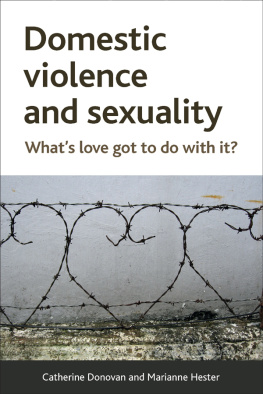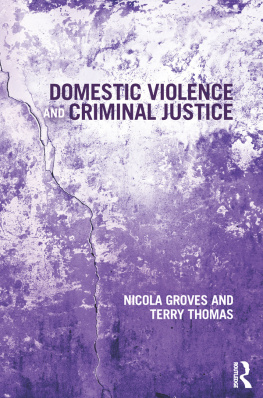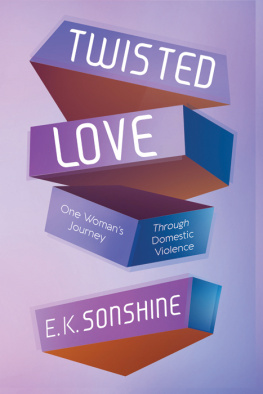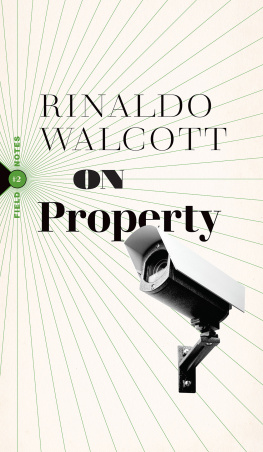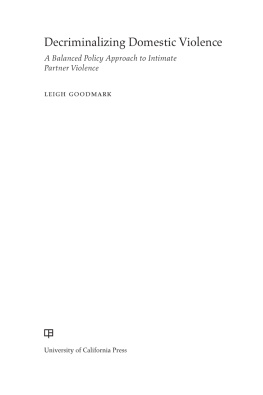Ardath Whynacht - Insurgent Love: Abolition and Domestic Homicide
Here you can read online Ardath Whynacht - Insurgent Love: Abolition and Domestic Homicide full text of the book (entire story) in english for free. Download pdf and epub, get meaning, cover and reviews about this ebook. year: 2021, publisher: Fernwood Publishing, genre: Home and family. Description of the work, (preface) as well as reviews are available. Best literature library LitArk.com created for fans of good reading and offers a wide selection of genres:
Romance novel
Science fiction
Adventure
Detective
Science
History
Home and family
Prose
Art
Politics
Computer
Non-fiction
Religion
Business
Children
Humor
Choose a favorite category and find really read worthwhile books. Enjoy immersion in the world of imagination, feel the emotions of the characters or learn something new for yourself, make an fascinating discovery.

- Book:Insurgent Love: Abolition and Domestic Homicide
- Author:
- Publisher:Fernwood Publishing
- Genre:
- Year:2021
- Rating:3 / 5
- Favourites:Add to favourites
- Your mark:
- 60
- 1
- 2
- 3
- 4
- 5
Insurgent Love: Abolition and Domestic Homicide: summary, description and annotation
We offer to read an annotation, description, summary or preface (depends on what the author of the book "Insurgent Love: Abolition and Domestic Homicide" wrote himself). If you haven't found the necessary information about the book — write in the comments, we will try to find it.
When loved ones transgress into violence, how do we seek justice and safety outside of policing and prisons?
Insurgent Love: Abolition and Domestic Homicide — read online for free the complete book (whole text) full work
Below is the text of the book, divided by pages. System saving the place of the last page read, allows you to conveniently read the book "Insurgent Love: Abolition and Domestic Homicide" online for free, without having to search again every time where you left off. Put a bookmark, and you can go to the page where you finished reading at any time.
Font size:
Interval:
Bookmark:
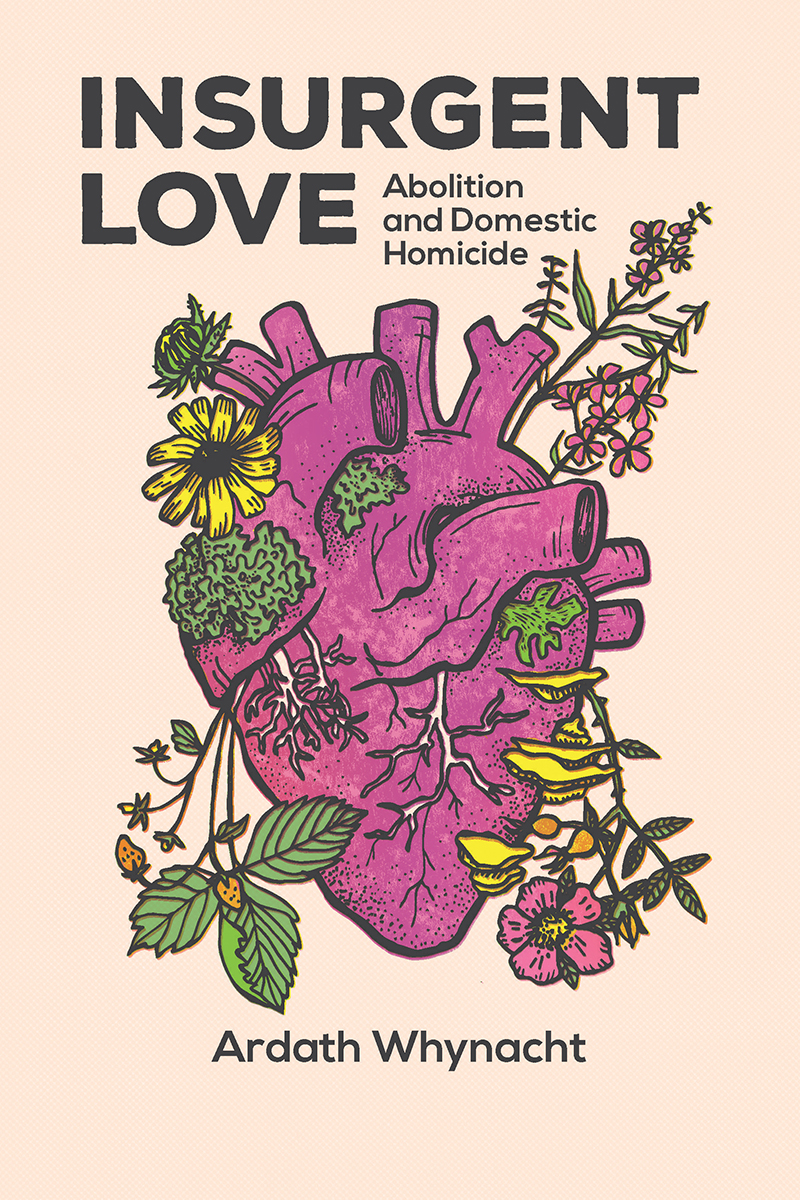
Insurgent
Love
Insurgent
Love
Abolition and Domestic
Homicide
Ardath Whynacht
Fernwood Publishing: Halifax & Winnipeg
Copyright 2021 Ardath Whynacht
All rights reserved. No part of this book may be reproduced or transmitted in any form by any means without permission in writing from the publisher, except by a reviewer, who may quote brief passages in a review.
Editing and text design: Brenda Conroy
Cover design and artwork: Emily Davidson
Printed and bound in Canada
Published by Fernwood Publishing: 32 Oceanvista Lane, Black Point, Nova Scotia, B0J 1B0 and 748 Broadway Avenue, Winnipeg, Manitoba, R3G 0X3
www.fernwoodpublishing.ca
Fernwood Publishing Company Limited gratefully acknowledges the financial support of the Government of Canada, the Canada Council for the Arts, the Manitoba Department of Culture, Heritage and Tourism under the Manitoba Publishers Marketing Assistance Program and the Province of Manitoba, through the Book Publishing Tax Credit, for our publishing program. We are pleased to work in partnership with the Province of Nova Scotia to develop and promote our creative industries for the benefit of all Nova Scotians.

Library and Archives Canada Cataloguing in Publication
Title: Insurgent love: abolition and domestic homicide / Ardath Whynacht.
Names: Whynacht, Ardath, author.
Description: Includes bibliographical references and index.
Identifiers: Canadiana (print) 20210260254 | Canadiana (ebook) 20210260378 | ISBN 9781773634838 (softcover) | ISBN 9781773630854 (Kindle) | ISBN 9781773634937 (PDF)
Subjects: LCSH: HomicideCanada. | LCSH: Family violenceCanada. | LCSH: Homicide investigationCanada. | LCSH: Discrimination in criminal justice administrationCanada. | LCSH: Police brutalityCanada. | LCSH: Law enforcementCanada.
Classification: LCC HV6535.C2 W49 2021 | DDC 364.1520971dc23
Contents
For Nora, our early spring crocus.
With love for all the impossible, tender things that sprout from the depths of the cruelest winters.
With gratitude for R., G., K. V. & S.
Preface
On a dark, wet evening in March 2016, I was struggling to light the fireplace when my phone rang.
Its Kristin, she said. Kristin is dead.
I paused. My guts went cold. Have they arrested Nick? Is he alive?
She gasped for air on the other end of the line, holding back tears so she could speak. Yes.
For decades, advocates who work with survivors of domestic violence have been predicting domestic homicide with tragic accuracy. Those who know know when someones life is in danger. That knowledge can save lives.
Kristin Johnstons relationship should have raised numerous red flags amongst her peers, but no one feared for her safety. Her friends and family recoiled in shock and surprise when her ex-boyfriend took her life. For those of us who are familiar with patterns in domestic homicide, red flags feel like sense memories. Its like smelling something familiar, but you arent sure where it is coming from or why it makes your blood run cold.
But what are we supposed to do when our fears are anchored in experience and our gut is telling us we are in danger?
What do we do with that?
Most precursors to domestic homicide are not necessarily criminal, and even when they are, few report the violence and even fewer receive consequences that lead to improved safety. Reporting to police can be dangerous as abusers often retaliate when bystanders or survivors report their concerns to police. Policing, as a general strategy of crime control in contemporary settler states, has not kept us safe from family violence.
I am someone who believes in abolishing police and prisons. Despite working for two decades with survivors of family violence and those who have been convicted of homicide, sexual abuse and intimate partner violence, I dont fear a world without prisons. Working with incarcerated people has given me an intimate glimpse into howrather than improving community safetypolicing, prosecution and imprisonment intensify the cycle of violence and create more dangerous conditions for us all.
Decades of activism, social research and brilliant scholarly work have made a case for abolishing prisons and police to improve safety and bring healing and justice to our communities. Abolitionist feminism seeks to transform the conditions that give rise to violence. Abolitionist feminism acknowledges that intimate partner and family violence cannot be seen as separate from state violence, which arises through the military and police. For those of us who want to see what the world looks like beyond the horizon of what Beth Richie calls a prison nation, we are indebted to Black and Indigenous feminists and queer, trans and two-spirit organizers, who have shown us a multitude of paths forward.
Yet, despite teaching and writing as an abolitionist, I still found myself perched on the edge of a hard wooden bench in a courtroom pleading for a guilty verdict for a friend of mine who had murdered his girlfriend. Ground zerothe territory in which the impacts of homicide are immediately feltis ripe with mess and contradiction. As Shira Hassan reminds us, transformative justice is nothing if not sitting with the beautiful mess ( Dixon and Piepzna-Samarasinha , 2020, p. 203). Thinking through the most dangerous forms of family violence and how we might respond without police, guns and state violence is heavy and hard.
With this book, I wanted to gesture towards transformative justice for domestic homicide. I wanted to start thinking about what an abolitionist strategy for domestic homicide might look like. I dont have all the answers. I share, however, my own journey in thinking through how we can get out of the dead end of carceral feminism and start contextualizing domestic homicide within settler colonialism and racial capitalism. We dont spend enough time thinking about what makes someone a killer. We dont have the right tools for responding to their violence and the risks they pose to our kin.
This book is my attempt to spark a conversation between those who work to understand domestic homicide and high-risk family violence and those who are committed to transformative and abolitionist movements for justice. The prison system should not be our only redress for homicide. I wanted to write something that could help us build spaces of safety and refuge so our movements can be inclusive to those who have been most deeply impacted by ongoing systems of coercion, control and violence. Writing this book is helping me to mend the tear that opened up in the earth beneath my feet on the day that Kristin Johnston died.
In the short period of time between the killing of Kristin Johnston and the final draft of this book, two high profile tragedies occurred in Nova Scotia. In Guysborough County, Shanna, Aaliyah and Brenda Desmond were killed by Lionel Desmond before he took his own life. In the community of Portapique, a mass shooting incident began with an attempted domestic homicide and resulted in the loss of twenty-two lives across Nova Scotia. This was the largest mass murder in Canadian history. These tragedies form the backbone of the story I seek to tell in the pages ahead.
Grappling every day with violence takes its toll. Many of us who make a daily practice of responding to violence in our communities face the cumulative effects of bystander or vicarious trauma. We often turn to this work because of our own experiences with violence, which leaves us processing layers of personal trauma with the effects of frontline work.
Font size:
Interval:
Bookmark:
Similar books «Insurgent Love: Abolition and Domestic Homicide»
Look at similar books to Insurgent Love: Abolition and Domestic Homicide. We have selected literature similar in name and meaning in the hope of providing readers with more options to find new, interesting, not yet read works.
Discussion, reviews of the book Insurgent Love: Abolition and Domestic Homicide and just readers' own opinions. Leave your comments, write what you think about the work, its meaning or the main characters. Specify what exactly you liked and what you didn't like, and why you think so.

